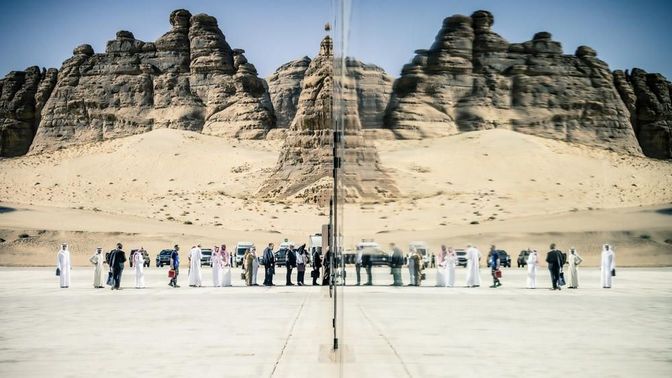

Avenues Towards De-escalation – The MSC Core Group Meeting in Doha
On October 28 and 29 in Doha, the Munich Security Conference held the second of two consecutive Core Group Meetings. More than 60 senior decision-makers and experts from the Middle East, Africa, Europe, and beyond met to discuss current crises, their security implications and paths towards de-escalation. In the days prior, another Core Group Meeting had taken place in Cairo. The two meetings are part of an event series in the region.
With tensions rising and conflicts in areas like Syria, Yemen, and the Strait of Hormuz becoming more acute, the security situation in the Middle East continues to deteriorate. The internationalization of Middle Eastern conflicts – both involving powers from the region as well as other international actors – has been a significant factor in stoking violence. These challenges are also increasingly linked to security dynamics on the African continent. For this reason the MSC decided to host two back-to-back Core Group Meetings: The first in Cairo, Egypt; the second one in Doha, Qatar. Together, the events served as a kick-off for a series of high-level events in the region, which will be continued with meetings in Turkey and Saudi Arabia.
More than 60 participants joined the meeting in Doha. Among the many prominent decision-makers from the region were the Emir of Qatar Sheikh Tamim bin Hamad Al-Thani, the Prime Minster of Qatar Abdullah bin Nasser bin Khalifa Al-Thani as well as Foreign Minister Sheikh Mohammed bin Abdulrahman Al-Thani, the Foreign Ministers of Iran and Oman, Mohammad Javad Zarif and Yusuf bin Alawi bin Abdullah, the President of the Kurdistan Regional Government Nechirvan Idris Barzani, and Nobel Peace Prize Laureate Tawakkol Karman. The Core Group Meeting in Doha was co-hosted by the Government of Qatar and was supported by the Qatari Ministry of Foreign Affairs and the League of Arab States.
From distrust to building confidence: De-escalation from within the region?
A full day of discussions in Doha revolved around the prospects for de-escalation in the Middle East’s two most violent conflicts – in Syria and Yemen – as well as for improving stability in an increasingly distrustful and militarized region. Due to the influx of armaments into the region, the intensity of conflicts is constantly rising, one representative warned. Participants were unified in expressing their regret at the lack of strong regional institutions for confidence-building. At the same time – while a role for external actors such as the US, the EU and China as facilitators was acknowledged – there was widespread agreement that lasting solutions for regional stability would have to come from the countries of the region themselves. Different approaches to initiating confidence-building measures were discussed: from reaffirming principles of sovereignty and non-intervention, to dialogues on economic development, to agreements on protecting cultural sites in conflict similar to those made during the Balkan Wars. The Helsinki Process, which led to the Conference on Security and Cooperation in Europe (CSCE) during the Cold War was mentioned as an example of de-escalation in times of high tension. However, it was also noted that the frequently shifting power dynamics in the region as well as internal socio-economic discontent could make such a process even more difficult in the Middle East.
With regard to ongoing conflicts in Syria and Yemen, participants lamented the inability of Europe or other international actors to prevent the bloodshed over the past years. Ambassador Wolfgang Ischinger, Chairman of the MSC underlined this point: "The case of Syria has shown that watching from the sidelines is not an option anymore." European representatives agreed and underscored the necessity of a European strategy for the region but simultaneously expressed skepticism over this coming to pass.
Energy and Cyber Security: Potential for cooperation?
Alongside the main program of the Core Group Meeting, the MSC also convened two roundtable discussion formats in Doha on the issues of cyber security and energy security, both of which may provide seedbeds for stronger inter-state cooperation in the region. The Cyber Security Roundtable formed part of the opening program of QITCOM, Qatar’s IT Conference and Exhibition. "Trust is the currency of diplomacy – and the currency of cyberspace is also trust," said Ischinger, underlining the recurring theme of the Core Group Meeting. At the roundtable, participants from the Middle East and Africa addressed their regions' specific cyber vulnerabilities. For, instance, cyber-attacks shutting down energy infrastructure in the Middle East – with global ramifications – was pointed out as a particular threat. The need for raising awareness and the level of human cyber security was a point of emphasis. Suggestions for regional cooperation on cyber security included the establishment of “cyber commands” within the Arab League and the African Union for assisting member states in countering threats.
At the parallel Energy Security Roundtable, discussions focused on the latest developments regarding the Strait of Hormuz and attacks on Saudi Arabian oil facilities. Participants from Europe expressed their concern about the current crises and underlined the reliance on energy security and freedom of navigation in the region. It was noted that neither the Gulf Cooperation Council nor the Organization of Petroleum Exporting Countries was currently effective in mediating the energy-security-related tensions in the region. One starting point for de-escalation brought up during the roundtable was the Hormuz Peace Endeavor proposed by Iran at the UN General Assembly.
Previous Core Group Meeting in Cairo: Cooperation and Convergence
Prior to the meeting in Doha, the MSC had already convened a preceding Core Group Meeting in Cairo, co-hosted by the Government of Egypt, from October 26 to 28. Focal points of the Cairo Core Group Meeting were issues of regional security cooperation, especially pertaining to the situation in the Horn of Africa and instability in Libya, Sudan, and the Sahel region, as well as common challenges for Arab and African states. Many discussion threads from Cairo were picked up again during the discussions in Doha.



